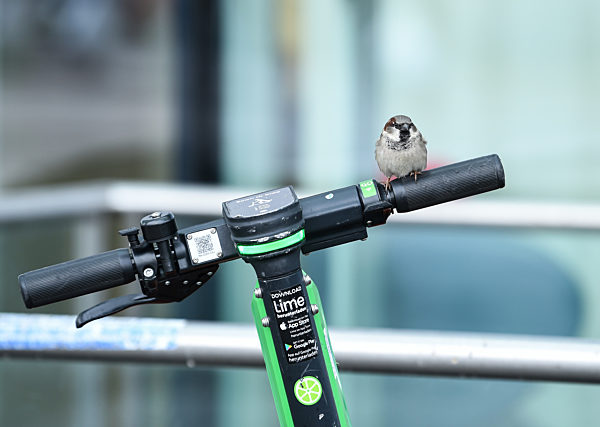Since 3 am on Thursday morning, Verdi trade union has brought the second warning strike against BVG this week. Unlike Monday’s strike, which didn’t result in serious disruptions for most transportation lines, U-Bahns, trams and buses are mostly expected to be cancelled until Friday afternoon.
In a city with the lowest rate of car ownership in the country (fewer than 350 cars per 1,000 inhabitants according to Civitas), public transportation closures hit hard, and the majority of Berliners are directly affected.
READ ALSO: Where are German transport strikes taking place Thursday and Friday?
But there are other ways to get around, and until 2 pm on Friday you really don’t have a choice. Here are the best ways to get across Berlin, or around your Kiez, without U-bahn, tram, or buses.
Two feet
With a sunny 11C Thursday and a partly sunny 14C Friday, there’s no reason not to to just go by foot – at least for shorter trips around your neighbourhood.
People who walk to work or school generally gain improved physical and mental health, and also report lower stress levels, especially when the habit is maintained over time.
So if you live close enough that you’re able to do so, and just haven’t given it a try before, the strike could be an opportunity to start a new healthy habit.
Bikes and e-scooters
As opposed to the Netherlands, Germany’s not really known for being a bike-friendly country, but plenty of Berliners commute across the capital city on their bikes every day.
If you’ve put your bike into storage for the winter, Thursday may be the day to pump up those tires and bring it out.
If you don’t have a bike, you can try borrowing a shared bike or e-scooter with one of the local bike and scooter sharing apps.
Each of the various scooter and bike rental companies tend to have their own apps that you need to download and sign-up for before renting a two-wheeled vehicle.
But a couple of them work with other ride-sharing apps you may already have: Lime scooters can be rented through the Uber app, and Bolt also offers a scooter share service in Berlin. Alternatively, if you have the BVG’s ‘Jelbi’ app, a number of scooter and bike services can be accessed there.

E-scooter companies have been preparing for Berlin’s transportation strike, reportedly putting more vehicles out at high-traffic locations leading up to the start of the strike.
READ ALSO: ‘Almost half’ of Germans in favour of ban on e-scooters
If you’re more comfortable on a bike, Nextbike is Berlin’s most popular and available bike sharing service. Increasingly Nextbikes can be found outside of Berlin’s S-Bahn ring, but it can be a bit tricky to park the bikes at the end of the journey as you head toward the Stadtrand, or outskirts of the city. Nextbikes need to be parked in designated parking zones, and beyond the S-bahn ring, these are typically only found a bike rental stations.
S-Bahn and regional trains
Say what you want about Deutsche Bahn, but when BVG shuts down, DB can get you there.
S-Bahns and regional DB trains are mostly still operational in Berlin, so passengers looking to travel across the city can likely find a route that works.
READ ALSO: Why a Deutsche Bahn job ad sparked laughs – and likely a few applicants
Naturally, if you have one of the nationwide €49 Deutschlandtickets (whether purchased through DB, a transport association like BVG or another transport), or one of Berlin’s regional €29 tickets, then you can ride the local trains freely in the city.
READ ALSO: What are the rules of Berlin’s new €29 travel pass?
Car sharing and taxi services
Car sharing has gained popularity in Berlin in recent years with a reported 8,000 share vehicles registered in the city.
The largest car share services are Miles and ShareNow/Free2Move – each accessed with smartphone apps that require a valid credit card and driver’s licence to be activated. Miles charges rentals by distance and ShareNow charges rentals by time.
Both car share services expect increased demand during strikes, and car shares generally cannot be pre-booked. However cars can be booked for 24 hours, or even several days, so if you are planning to use one for a longer period.
Interestingly, according to Berlin Morgenpost, car sharing can actually be cheaper than Uber or taxis services for some trips – the local newspaper suggests that a single trip from City West to BER Airport costs about half as much as the same trip in an Uber.
That said, if you don’t have a driver’s licence that is valid in Germany, you may have to settle for taxi services after all. Traditional taxis can be booked online, by phone or by app via Taxi Berlin. Alternatively, many passengers use rideshare apps like Bolt, Freenow, or Uber, which can be more convenient in some cases, and often cheaper.



 Please whitelist us to continue reading.
Please whitelist us to continue reading.
Member comments